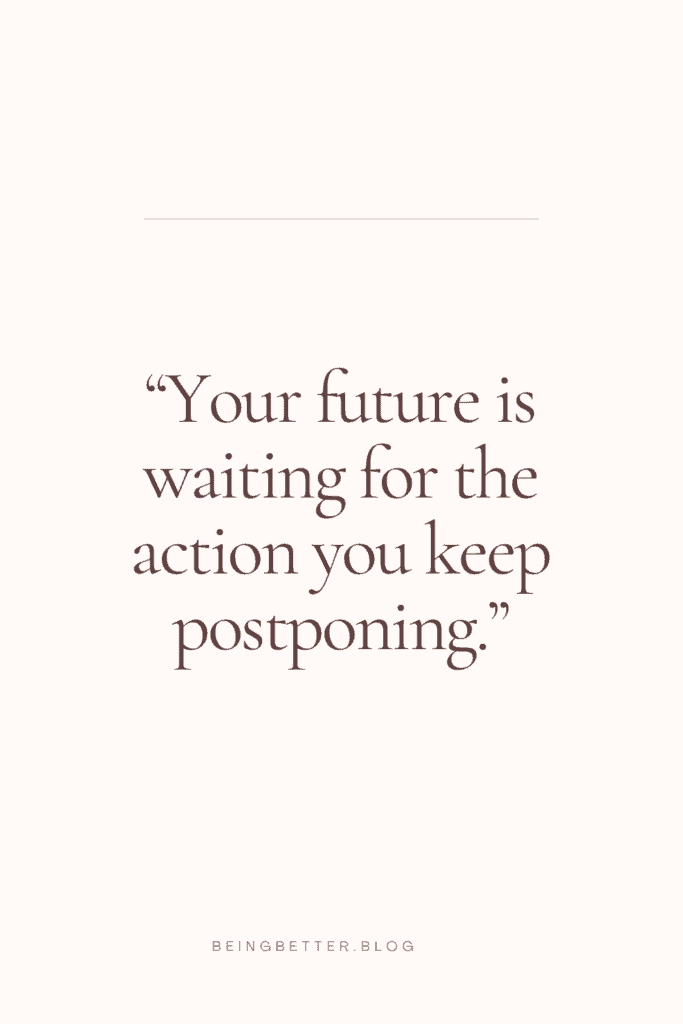
Why Do We Procrastinate? How to overcome that? Let’s Talk About It
I’ve lost several precious days to the “I’ll do it later” trap — and honestly, I paid a heavy price for it. I missed golden opportunities, my mind and space became cluttered, and peace felt out of reach. Back then, I didn’t even understand why I kept putting things off. But once I realized how deeply it was affecting my life, I knew something had to change. So I turned to journaling and started digging into the real reasons behind my procrastination. Some were personal discoveries, and others came from what researchers say — all of it opened my eyes. I also began trying out a few practical solutions that didn’t feel overwhelming, and they slowly started shaping a new version of me — calmer, more intentional, and no longer ruled by endless to-do lists. And today, I’m happy to share those insights with you too.
Let’s break it down in a simple, relatable way.
Table of Contents
1. The Mental Block – “What If I Fail?”
Ever avoided starting something because you were scared of messing it up? Maybe you wanted to apply for a job, start a blog, or even have a tough conversation with someone—but the fear of failure held you back.
So, How can we solve this?
✅ Reframe failure as learning – Have the mindset that, even if we fail, that would be a golden opportunity to learn something brand new, that is meant to be for us, specifically. Nobody in this world can teach you the lesson from our own experimental failures. That’s worth it!
✅ Shrink the First Step Until It’s Not Scary– Make your first action so small, it doesn’t feel risky; Fear shrinks when action starts.
✅Write Down the Worst-Case Scenario (and Solve It)– “What’s the actual worst that could happen?”
Then write a few solutions or backups.
Seeing it on paper makes it way less scary in your head.
✅Talk to Yourself Like a Friend Would– Would you tell a friend, “Don’t try, you’ll probably fail”?
Of course not. You’d say: “You’ve got this. Even if it’s messy, it’s better than standing still.”
Try using that same compassion for yourself.
✅Visualize Success — Not Just Fear– Spend 1 minute imagining what it will feel like when: You complete it-You grow from it- You’re proud you started- Let that good emotion drive you forward.
✅ Don’t Wait to Feel Ready — Act Anyway– Confidence comes from doing, not thinking.
Try: “I’ll take imperfect action for 10 minutes. That’s it.”
Momentum builds from movement.
✅ Try exposure therapy – Start small and put yourself out there gradually (e.g., write a rough blog draft instead of a polished post- I was practicing this whenever the fear of failure hits me)
Or, if you’re afraid to post your first video, don’t aim for a perfect production—just film something casual and share it with a small group first.
There’s absolutely nothing wrong with failing. Every failure comes with a lesson, and that lesson might be exactly what leads to your next success. So don’t hesitate to take the first step and stay committed to the learning journey all the way through.
2. Perfectionism – “It Has to Be Just Right”
If you’ve ever spent hours researching, planning, and overthinking a task but never actually doing it, welcome to the perfectionist club.
When I first started blogging, I was researching the whole topic for weeks just to make a perfect article for my readers. I had nothing published for months and there was a gap of almost one month between my two blog posts.
But later I realised that, each time I am improving by myself, so the best way to speed up my journey is by practice instead of looking for the perfectionism.
Nobody can be 100% perfect, one or another person can find few flaws in everything in this world.
Perfectionism is the biggest reason behind every delay and procrastination- If you have the courage to take the first step, whatever it may be, the rest will follow you!
So, How can we solve this?

✅ Set a time limit – Give yourself a strict deadline to complete a task, even if it’s not perfect. But it will always be better than delaying that particular action.
✅ Use the 80/20 rule – 20% of the effort gives 80% of the results. Stop obsessing over small details. So, what matters is your action. Results come from action, not from waiting.
✅ Set Realistic Standards– Never ever dream or plan for something that cannot be achieved, which can delay your whole process. So, better understand yourself and your limits, before you start anything.
✅ Celebrate even small progress– This is a great motivation and a pull you can give yourself- It will act as a fuel for your coming steps.
✅ Be open to feedback and Criticism– Most people who are waiting for the perfect time and perfect work are scared of negative feedback. But those criticisms can only make you better, don’t forget that. Always be open to feedback on our work, so you will definitely improve your next step.
3. Overwhelm – “Where Do I Even Start?”
Sometimes tasks feel so big that we don’t even know where to begin. Instead of breaking them down, we avoid them completely. This further results in overcrowding or buildup of many unfinished tasks.
If we have a cluttered table, we will not be having any idea on where to start organizing
Same in the case of a cluttered mind, an overloaded inbox, a messy kitchen or dining hall, our clothes wardrobe, etc.
This kind of clutter has a strong motive to pull us behind, leaving us in a most miserable condition. Let’s tackle this together-
So, How can we solve this?
✅ Break it down into tiny steps – Declutter one corner( or you can decide- first do clearly visible ones, or big ones or like that) at a time.
✅ Set time limit for each step – Once you decide what is first, what next and so on, set a time limit and challenge yourself to finish that task in time. You may feel it more like a game, and finally you will win yourself! Also, remember that, no need to finish the whole task in one stretch; you can set a specific five or ten minutes any time and come and finish.
✅ Use the 5-minute rule – Tell yourself you’ll only do the task for five minutes. Once you start, you’ll often keep going. Most people including me have this starting trouble, which I managed with this 5-minute rule.
✅ Make a starting list– Remember it is not a to-do list, but a listing of each and every tiny step on how to start- for example: Look at the table- decide what to do first- set a time limit for that task- Bring the waste bin in- start sorting… and so on. This would be a clear roadmap for you to start.
✅ Shift from perfect starting to any start– Let go of trying to find the perfect plan or strategy.
Just starting somewhere — even messy — is progress.

4. Distractions – “Let Me Just Check My Phone Real Quick”
We live in a world full of distractions. One moment, you’re about to start working… the next, you’re deep into TikTok videos about a dog learning how to skateboard.
I once sat down to write an article and thought, I will google some relevant keywords and topics. Thirty minutes later, I was scrolling through an online outfit store… something I had no intention of doing. Sound familiar?
This tends to happen to me even now, but with clear strategies, I am saving a lot of my precious time. Let’s dive into that together:
So, how can we solve this?
✅ Keep phone out of sight – Simply placing your phone away makes a huge difference.- Out of sight, out of mind
✅ Set screen time limits – Set time limits for major social media apps, so that you will get notified if you cross the limits.
✅ Try the Pomodoro Technique – 25 minutes of work, 5 minutes of break. It keeps your brain engaged.(but don’t forget to set a reminder for this 5 min)
✅Have a Distraction Notebook Nearby– If you suddenly remember something (e.g., “I need to reply to that DM”), write it down instead of checking your phone.
You’ll feel more in control and less impulsive. I found this very helpful. We will be having a list of things to do with our phone when we are doing something else, so set a time for those tasks too. That works!
✅Set a Short-Term Commitment with Yourself– Commit to yourself that, until you finish this certain step, you will not touch your phone. This can save a lot of time and can give you a sense of self-pride and accomplishment!
✅ Reward Yourself After Staying Focused – Promise yourself a scroll break, snack, or short walk after you complete your task.
When your brain knows a reward is coming, it’ll cooperate better.
5. “It’s Boring, So I’ll Do It Later”

Let’s be honest—some tasks just aren’t fun. Washing dishes, doing laundry, or organizing files? Not exactly thrilling. But delaying them only makes things worse.
So, how can we solve this?
✅ Pair it with something fun – Listen to music or a podcast while doing the task. Some days, when I don’t have any motivation to cook, I will play some energetic songs in the kitchen and cook along with dancing, which saves me money from buying food outside.
✅ Turn it into a challenge – Set a timer and try to beat the clock. The urgency adds excitement to the otherwise dull task.
✅ Gamify It – Turn it into a game: Give yourself points for each subtask you complete- Track progress on a sticky note-Or try: “If I finish this, I unlock 15 mins of [fun activity]!- A small treat makes the task feel worth it.
✅ Switch to a Micro-Task Mentality– Don’t tell yourself “I have to do this boring thing.”
Tell yourself:
“I just need to do one tiny part of it right now.”
Shrink the task until it feels almost silly not to start.
✅Alternate Boring & Fun Tasks– If your to-do list is long, use a boring-fun-boring-fun rhythm: 15 minutes cleaning- 10 minutes gardening- 5 minutes Pinterest- 10 minutes cleaning, like that.
✅Use a “Done List” for Motivation– Every time you finish even a small boring task, write it on a “Done Today” list. That sense of satisfaction and dopamine boost keeps you on track for further actions.
6. No Deadline = No Urgency
When a deadline is far away, do you procrastinate? But when it’s due tomorrow, you suddenly become a productivity machine? That’s because our brains respond to urgency. In college, I once had a month to write a paper. I kept telling myself, I’ll start tomorrow. Then, the night before it was due, I pulled an all-nighter. I finished it… But I also suffered.
So, how can we solve this?
✅ Create artificial deadlines – Tell yourself it’s due in three days instead of three weeks.
✅ Break It Into Mini-Deadlines – If you have an activity with a deadline far away, break that task into multiple small steps and start by doing the first step. Also, set a clear timetable for all other steps and have it done!
✅ Set calendar reminders – Schedule specific work blocks and set reminders can keep you on track.
✅Make the outcome motivate you– “What will I miss out on if I keep delaying this?” Write it down and motivate yourself to start today!
✅Future-Self Check-In- “What will my future self thank me for — doing this now or putting it off again?”
Visualize how good it’ll feel to get it done today.
✅ Reward yourself for meeting the deadline – Motivate yourself by tying action to emotion:- Reward: “If I finish by Thursday, I’ll treat myself to a movie night.” Consequence: “If I don’t finish this, I can’t scroll social media tonight.” (make it according to your own interest)
7. Low Energy – “I Just Can’t Right Now”
Sometimes procrastination isn’t about laziness—it’s about exhaustion. Lack of sleep, poor diet, or stress can drain our motivation. I noticed that whenever I had a bad night’s sleep, I procrastinated more the next day. My brain just couldn’t focus. But when I prioritized rest, I got things done faster. Also, there are different ways to gently nudge yourself forward without burning out!

So, how can we solve this?
✅ Prioritize sleep – Sometimes, you’re truly drained and need rest. Lack of rest kills focus. Aim for at least 7-8 hours. Sleep is our ultimate energy booster.
✅ Have healthy food and drink enough water – Avoid sugar crashes; eat protein, healthy fats, and whole grains.
✅ The 2-Minute “Show Up” Rule – Tell yourself:- “I’ll just show up for 2 minutes.”
Sit at your workspace. Open the file. Do something tiny.
Once you begin, the next step often comes easier.
✅Rest with a Time Limit (Not Avoidance)– If you’re truly tired, allow rest intentionally — not as an escape.
Set a 15–30 min rest timer: Lie down, meditate, stretch, nap- No screens or scrolling- Then restart with renewed clarity.
✅Use a Mini Priority List (Just 1-3 Things)- Low energy + a long to-do list = overwhelm.
Instead, pick just 1–3 important tasks for the day.
If you get through one, that’s still a win.
✅Connect with Your “Why” — But Gently- Remind yourself: “What will feel better later — pushing through gently now or carrying the stress into tomorrow?”
No guilt — just honest reflection.
✅ Match tasks to energy levels – Do creative or intense tasks during high-energy windows- Save admin or repetitive tasks for low-energy times- Track your rhythm for a few days to spot patterns.
If you’ve related to any of these points, don’t worry—procrastination is something everyone deals with. But the good news? You can train yourself to overcome it. Here are some quick tips:
At the end of the day, action is what breaks procrastination. Even the tiniest step forward is better than waiting for the “perfect” moment. This is how I am withstanding my procrastinating tendency every time. Hope these can help you too!
Are You ready to take charge? Follow these 5 Golden Rules to Overcome Procrastination and see the difference!



